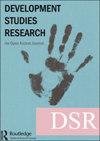Is tourism a spur to economic growth in South Africa? An empirical investigation
Q2 Social Sciences
引用次数: 8
Abstract
ABSTRACT In this study, the dynamic Granger-causality between tourism development and economic growth in South Africa was empirically examined during the period 1995-2016. The study was motivated by the limelight that the South African tourism sector has been enjoying in recent years, on the one hand, and the lack of sufficient coverage of tourism-growth nexus studies in many sub-Saharan African countries, on the other hand. The study used two tourism proxies, namely tourist arrivals and tourism revenue, to examine this link. In addition, the study used exchange rate and foreign direct investment as intermittent variables in a multivariate Granger-causality model in order to address the omission-of-variable bias. Using the auto-regressive distributed lag (ARDL)-bounds testing approach, the study found that although the direction of causality between tourism development and economic growth in South Africa is sensitive to the proxy used and the time under consideration, in the main, a feedback relationship tends to predominate in the short run. The study, therefore, recommends that short-term policy efforts be directed at developing the tourism and the real sectors as both sectors have been found to reinforce each other in the short run, irrespective of the tourism proxy used.旅游业是南非经济增长的刺激因素吗?实证调查
摘要在本研究中,对1995-2016年期间南非旅游业发展与经济增长之间的动态格兰杰因果关系进行了实证检验。这项研究的动机一方面是南非旅游业近年来备受关注,另一方面是许多撒哈拉以南非洲国家缺乏足够的旅游业增长关系研究。该研究使用了两个旅游指标,即游客到达量和旅游收入,来检验这种联系。此外,该研究使用汇率和外国直接投资作为多变量Granger因果关系模型中的间歇变量,以解决变量偏差的遗漏问题。使用自回归分布滞后(ARDL)边界检验方法,研究发现,尽管南非旅游业发展和经济增长之间的因果关系方向对所使用的代理和所考虑的时间很敏感,但总的来说,短期内反馈关系往往占主导地位。因此,该研究建议,短期政策努力应致力于发展旅游业和实体部门,因为无论使用何种旅游代理,这两个部门都会在短期内相互加强。
本文章由计算机程序翻译,如有差异,请以英文原文为准。
求助全文
约1分钟内获得全文
求助全文
来源期刊

Development Studies Research
Social Sciences-Development
CiteScore
3.20
自引率
0.00%
发文量
20
审稿时长
12 weeks
期刊介绍:
Development Studies Research ( DSR) is a Routledge journal dedicated to furthering debates in development studies. The journal provides a valuable platform for academics and practitioners to present their research on development issues to as broad an audience as possible. All DSR papers are published Open Access. This ensures that anyone, anywhere can engage with the valuable work being carried out by the myriad of academics and practitioners engaged in development research. The readership of DSR demonstrates that our goal of reaching as broad an audience as possible is being achieved. Papers are accessed by over 140 countries, some reaching over 9,000 downloads. The importance of the journal to impact is thus critical and the significance of OA to development researchers, exponential. Since its 2014 launch, the journal has examined numerous development issues from across the globe, including indigenous struggles, aid effectiveness, small-scale farming for poverty reduction, sustainable entrepreneurship, agricultural development, climate risk and the ‘resource curse’. Every paper published in DSR is an emblem of scientific rigour, having been reviewed first by members of an esteemed Editorial Board, and then by expert academics in a rigorous review process. Every paper, from the one examining a post-Millennium Development Goals environment by one of its architects (see Vandermortele 2014), to ones using established academic theory to understand development-imposed change (see Heeks and Stanforth 2015), and the more policy-oriented papers that contribute valuable recommendations to policy-makers and practitioners (see DSR Editor’s Choice: Policy), reaches a multidisciplinary audience.
 求助内容:
求助内容: 应助结果提醒方式:
应助结果提醒方式:


